现在完成时用法小结
现在完成时用法总结

现在完成时用法总结现在完成时用法总结总结是指社会团体、企业单位和个人在自身的某一时期、某一项目或某些工作告一段落或者全部完成后进行回顾检查、分析评价,从而肯定成绩,得到经验,找出差距,得出教训和一些规律性认识的一种书面材料,它可以使我们更有效率,不如立即行动起来写一份总结吧。
我们该怎么去写总结呢?下面是小编整理的现在完成时用法总结,欢迎大家分享。
一、基本结构:主语+have/has+动词的过去分词①肯定句:主语+have/has+动词的过去分词+宾语.②否定句:主语+have/has+not+动词的过去分词)+宾语.③一般疑问句:Have/Has+主语+动词的过去分词+宾语.④特殊疑问句:特殊疑问词或词组+一般疑问句(have/has+主语+过去分词(V-ed)+其他)过去分词变化规则如下:1 、规则动词:规则动词的过去分词的构成规则与规则动词的过去式的构成规则相同。
四点变化规则:(1)一般动词,在词尾直接加“ ed ”。
work---worked---worked , visit---visited---visited(2)以“ e ”结尾的动词,只在词尾加“ d ”。
live---lived---lived(3)以“辅音字母+ y ”结尾的动词,将"y" 变为"i" ,再加“ ed ”。
study---studied---studied , cry---cried---cried(4)重读闭音节结尾,末尾只有一个辅音字母,先双写该辅音字母,再加“ ed ”。
stop---stopped---stopped , drop---dropped--dropped2 、不规则动词变化需参看不规则动词表逐一熟记。
例如:cut- cut- cut, hit-- hit-- hit二、用法1 、现在完成时用来表示过去发生或已经完成的动作对现在造成影响或后果。
也就是说,动作或状态发生在过去但它的影响现在还存在,强调的是现在。
现在完成时的用法详解英语

• Is your father in ?
•
No, heha__s_g__o_n__e__t_o___ to Shenzhen.
•
H__a__s___he everb_e_e__n__ there before ?
•
Yes, heh_a_s__b_e__e_n_____ there several times
ago.
A. Did…copy…did
B. Have…copied…have
C. Have…copied…did D. Did …copy…had
5. “Why _A_____ she _______ angry ?”
“Because he _____ at her just now .”
A. did…get…shouted B. has…got…shouted
A. Have…gone to B. Have…gone in
C. Have…been to D. Have …been in
3. My brother _C___college for over three years.
A. has gone to B. has been to C. has been at
但是不能和表示一段时间的状语连用。
短暂性动词变延续性动词:
• join --- be in / a
2) comeb-e-- in / at
• 3) borrow ---keep 4) buy -h-a-ve
5) arrive ---be
6) leave b--e- away (from)
7) begin --b- e on
• It has been colds_in__c_e__ two weeks ago.
现在完成时态用法小结
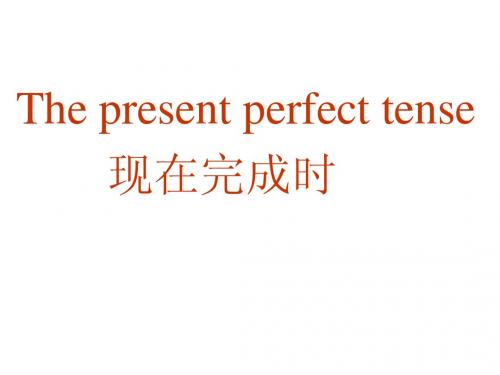
瞬间动词不能和表示一段时间的时间状语连用,但是他可以转换 成相应的延续性动词. 1.直接用延续性动词 buy– have catch (get) a cold –have a cold come/go /become—be
borrow/lend—keep put on-- wear 2.转换成be+名词 join the army – be a soldier
--- No, never,but I went to Canada a few years ago.
8. You haven’t changed your mind,_______? c A do you B are you C have you D did you
9. How long have you _____ the football team of the school?
A bought B borrowed C had D lent
12. –Excuse me, ____ you seen the film yet? --- Yes, I _____ it last night. A have, see B have, have seen C have, seen D have, saw 13. He has never ridden a horse before,_____?
A been on B been at C joined D played
10. ---Where have you _____ these days? ---- I have _____ to Dazhu with my friends. A been , gone B been , been C gone , been D gone, gone 11. How long have you ____ this book?
现在完成时用法小结
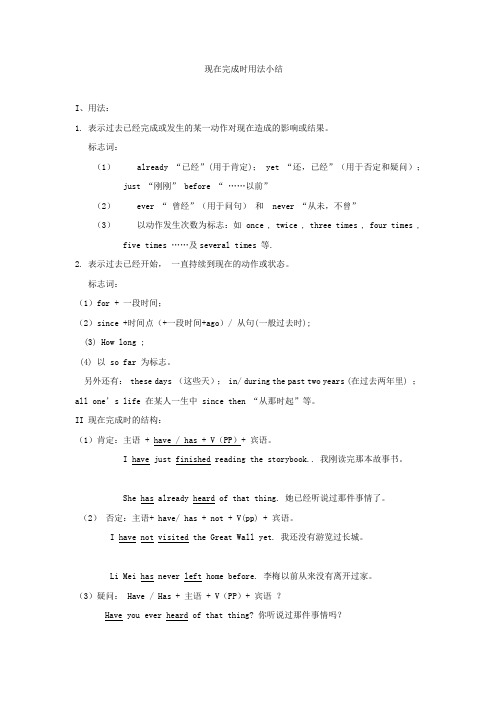
现在完成时用法小结I、用法:1. 表示过去已经完成或发生的某一动作对现在造成的影响或结果。
标志词:(1) already “已经”(用于肯定); yet “还,已经”(用于否定和疑问);just “刚刚” before “……以前”(2) ever “曾经”(用于问句)和 never “从未,不曾”(3)以动作发生次数为标志:如 once , twice , three times , four times , five times ……及several times 等.2. 表示过去已经开始,一直持续到现在的动作或状态。
标志词:(1)for + 一段时间;(2)since +时间点(+一段时间+ago)/ 从句(一般过去时);(3) How long ;(4) 以 so far 为标志。
另外还有: these days (这些天); in/ during the past two years (在过去两年里) ;all one’s life在某人一生中 since then “从那时起”等。
II 现在完成时的结构:(1)肯定:主语 + have / has + V(PP)+ 宾语。
I have just finished reading the storybook.. 我刚读完那本故事书。
She has already heard of that thing. 她已经听说过那件事情了。
(2)否定:主语+ have/ has + not + V(pp) + 宾语。
I have not visited the Great Wall yet. 我还没有游览过长城。
Li Mei has never left home before. 李梅以前从来没有离开过家。
(3)疑问: Have / Has + 主语 + V(PP)+ 宾语?Have you ever heard of that thing? 你听说过那件事情吗?Has she ever spoken to an American? 她跟美国人说过话吗?III.现在完成时和一般过去时的区别:1. 现在完成时和现在密切相关,要么过去发生的动作对现在造成一定影响或结果;要么动作持续到现在。
现在完成时的用法及常见句型总结

现在完成时的用法及常见句型总结现在完成时是英语中常用的时态之一,表示过去发生的动作或事件对现在造成的影响或结果。
在本文中,我们将总结现在完成时的用法和常见句型。
一、用法:1. 表示过去发生的动作或事件对现在的影响,即强调动作或事件的结果在现在仍然存在或持续发生。
例句:I have lost my key.(我丢了我的钥匙,现在找不到)She has been to Japan.(她曾去过日本,现在还记得日本的经历)2. 表示过去一段时间内发生的动作或事件,但并不强调具体的时间点。
例句:We have studied English for five years.(我们已经学英语五年了)He has written three novels.(他已经写了三本小说)3. 表示过去发生的动作或事件对现在仍然具有重要性或关联。
例句:I have seen that movie three times.(我看过那部电影三次了,说明对该电影有兴趣或思考)She has lived in this city since 2005.(她自2005年以来一直住在这个城市)二、常见句型:1. 肯定句结构:主语 + have/has + 过去分词例句:I have completed my homework.(我已经完成作业)They have visited Paris.(他们已经参观过巴黎)2. 否定句结构:主语 + have/has + not + 过去分词例句:She has not finished her project yet.(她还没完成她的项目)We have not seen him for a long time.(我们很久没见他了)3. 疑问句结构:Have/Has + 主语 + 过去分词 + 其他?例句:Have you ever been to New York?(你去过纽约吗?)Has he finished his report?(他完成报告了吗?)4. 现在完成时与时间状语连用,常用的时间状语有:already(已经),just(刚刚),recently(最近),ever(曾经),never(从未),for(表示时间段),since(自从...以来)。
现在完成时用法小结(合集五篇)
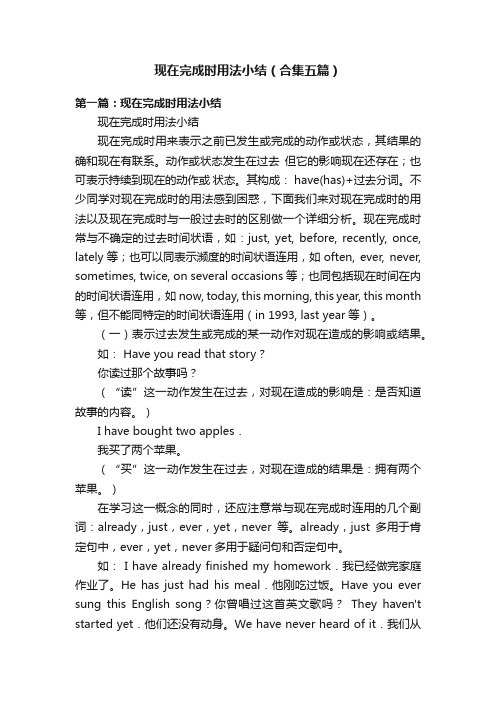
现在完成时用法小结(合集五篇)第一篇:现在完成时用法小结现在完成时用法小结现在完成时用来表示之前已发生或完成的动作或状态,其结果的确和现在有联系。
动作或状态发生在过去但它的影响现在还存在;也可表示持续到现在的动作或状态。
其构成: have(has)+过去分词。
不少同学对现在完成时的用法感到困惑,下面我们来对现在完成时的用法以及现在完成时与一般过去时的区别做一个详细分析。
现在完成时常与不确定的过去时间状语,如:just, yet, before, recently, once, lately等;也可以同表示濒度的时间状语连用,如often, ever, never, sometimes, twice, on several occasions等;也同包括现在时间在内的时间状语连用,如now, today, this morning, this year, this month 等,但不能同特定的时间状语连用(in 1993, last year等)。
(一)表示过去发生或完成的某一动作对现在造成的影响或结果。
如: Have you read that story?你读过那个故事吗?(“读”这一动作发生在过去,对现在造成的影响是:是否知道故事的内容。
)I have bought two apples.我买了两个苹果。
(“买”这一动作发生在过去,对现在造成的结果是:拥有两个苹果。
)在学习这一概念的同时,还应注意常与现在完成时连用的几个副词:already,just,ever,yet,never等。
already,just多用于肯定句中,ever,yet,never多用于疑问句和否定句中。
如: I have already finished my homework.我已经做完家庭作业了。
He has just had his meal.他刚吃过饭。
Have you ever sung this English song?你曾唱过这首英文歌吗?They haven't started yet.他们还没有动身。
现在完成时态的用法总结(完整汇总)

now(2000)
since+表示时间点的词或时间状语从句 for +表示时间段的词
I have been a teacher since 1995.
I have been a teacher since I came to Shenzhen. I have been a teacher for five years.
How long has she learnt how to dance?
She has learnt how to dance for five months.
She has learnt how to dance since April.
(2000.4---2000.9)
How long have you learnt English?
He has been a teacher for ten years.
He has been a teacher since 1990.
He has been a teacher since he left college in 1990.
(1990-2000)
(left college)
(2000.7—2000.9)
You have lived in Shenzhen since 1985. You have lived in Shenzhen for f;表示时间点的词或时间状语从句]
since 1985 now(2000) (for fifteen years)
1985 [for+表示一段时间的词]
Exercises. Use “since” or “ for” to fill in the blank.
现在完成时的用法与例句
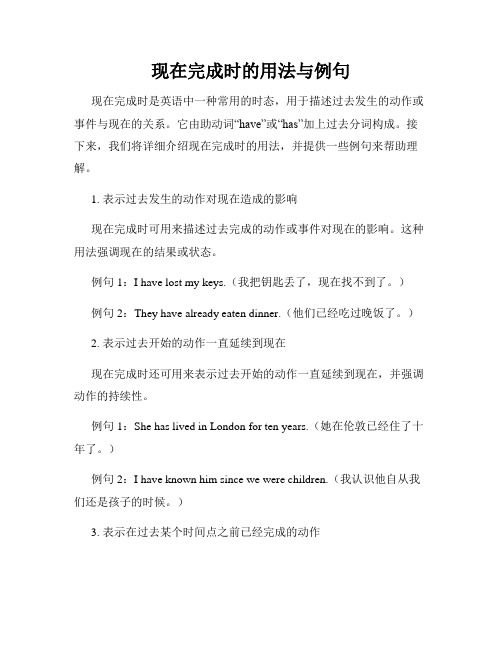
现在完成时的用法与例句现在完成时是英语中一种常用的时态,用于描述过去发生的动作或事件与现在的关系。
它由助动词“have”或“has”加上过去分词构成。
接下来,我们将详细介绍现在完成时的用法,并提供一些例句来帮助理解。
1. 表示过去发生的动作对现在造成的影响现在完成时可用来描述过去完成的动作或事件对现在的影响。
这种用法强调现在的结果或状态。
例句1:I have lost my keys.(我把钥匙丢了,现在找不到了。
)例句2:They have already eaten dinner.(他们已经吃过晚饭了。
)2. 表示过去开始的动作一直延续到现在现在完成时还可用来表示过去开始的动作一直延续到现在,并强调动作的持续性。
例句1:She has lived in London for ten years.(她在伦敦已经住了十年了。
)例句2:I have known him since we were children.(我认识他自从我们还是孩子的时候。
)3. 表示在过去某个时间点之前已经完成的动作现在完成时也可以表示在过去某个时间点之前已经完成的动作,而时间点可以是具体的或不具体的。
例句1:He has already finished his homework.(他已经完成了作业。
)例句2:We have never been to Japan.(我们从未去过日本。
)4. 表示经历或体验过的动作或事件现在完成时还可以用来表达对某个动作或事件的经历或体验。
例句1:She has traveled to many countries.(她游览过许多国家。
)例句2:I have seen that movie before.(我之前看过那部电影。
)5. 与表示一段时间的状语连用现在完成时可以与表示一段时间的状语连用,表达在这段时间内已经完成了某个动作或事件。
例句1:They have worked together for five years.(他们已经一起工作了五年。
现在完成时的用法归纳

现在完成时的用法归纳一、构成现在完成时:肯定句:主语 + have/has + 过去分词否定句:主语 + have/has + not + 过去分词一般疑问句:Have/Has + 主语 + 过去分词?肯定回答:Yes, 主语 + have/has.否定回答:No, 主语 + have/has + not.二、表示动作发生的时间:1. 表示过去一些时间点开始的动作或事件并一直延续至今。
如:We have known each other since childhood.(我们从小就认识彼此。
)2. 表示过去段时间内发生的动作或事件,强调持续的时间。
如:She has lived in London for five years.(她已经在伦敦住五年了。
)三、表示经验、知识和技能四、表示动作发生的结果或变化:五、表示经过多次的动作或事件:六、与时间状语连用:1. For + 时间段:表示持续的时间。
如:He has been studying English for two hours.(他已经学习英语两个小时了。
)2. Since + 时间点:表示一个具体的时间点。
如:They have been friends since they were children.(他们从小就是朋友。
)3. Just,already,yet等词:表示已经发生过或尚未发生的动作或事件。
如:She has just finished her homework.(她刚做完她的作业。
)4. Ever,never等词:表示曾经或从未发生过的动作或事件。
如:Have you ever been to Japan?(你曾经去过日本吗?)总之,现在完成时用于表示与现在有关的过去动作或事件,我们在使用时要注意动作的发起时间、持续时间以及对现在的影响等方面,并且要合理运用时间状语以增强句子的准确性和表达能力。
现在完成时态的用法总结 完整汇总
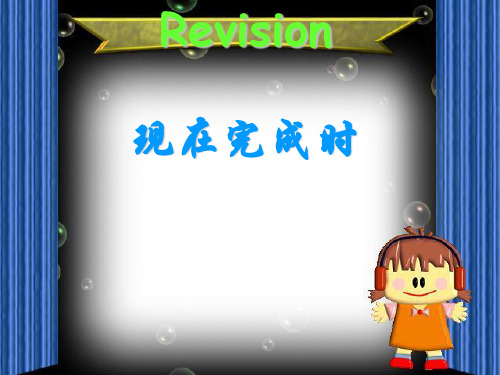
4 非延续性动词表示状态有三种方法: (1)用相应的延续性动词来替换非延续性动词。
句中的谓语动词一般用现在完成时,时间状语为
“for +时间段”或“since +时间点(过去某一时刻或非延续性 动词的一般过去时从句)”或用在how long的问句中。例如:
They have been here for five years.他们来这里已经五年了。 (这里come这一非延续性动词改成了be。)
④ He has just had his meal. 他刚吃过饭。
⑤ They haven‘t started yet.他们还没有动身。 ⑥ We have never heard of it.我们从来没有听说过这件事。
2.现在完成时态既涉及过去,又联系现在,它可表示动作或状 态过去已经开始一直延续到现在,和由 “for+时间段” 或
(1992—2000)
(won the prize for music)
(1988—2000) worked in this hospital
How long has she learnt how to dance? She has learnt how to dance for five months. She has learnt how to dance since April.
Revision 现在完成时
1.现在完成时的基本句式是
“have(has)+过去分词”。
如: ① I have seen that film. 我已经看过那部影片了。
② We have just finished our homework. 我们刚刚做完家庭作业.
③ She has gone home. 她回家去了。
现在完成时知识点归纳总结

现在完成时知识点归纳总结现在完成时是英语中一个重要的时态,用于表示过去发生的动作或事情对现在产生的影响或结果。
下面是对现在完成时的知识点进行归纳总结:一、现在完成时的构成现在完成时的构成由“助动词have/has + 过去分词形式的动词”组成,其中have用于第一人称(I, we)以及第二人称(you),has用于第三人称单数(he, she, it)。
1. 肯定句的构成:主语 + have/has + 过去分词形式的动词例如:- I have studied English for three years.- He has finished his homework.2. 否定句的构成:主语 + have/has + not + 过去分词形式的动词例如:- She hasn't visited London yet.- We haven't seen the movie.3. 疑问句的构成:Have/Has + 主语 + 过去分词形式的动词 + 其他?例如:- Have you ever traveled abroad?- Has she lived in this city before?二、现在完成时的用法1. 表示过去的行动或事件对现在的影响或结果。
例如:- She has lost her keys. (她现在找不到她的钥匙。
)- He has worked hard, so he is tired. (他过去努力工作,所以他现在很累。
)2. 表示从过去某个时间开始一直持续到现在的动作或状态。
例如:- They have lived in the same house for 10 years. (他们从10年前开始就一直住在同一栋房子里。
)- I have known him since we were kids. (我从我们还是孩子的时候就认识他了。
)3. 表示过去经历的事情或已经完成的动作。
现在完成时(The-present-perfect-tense)的用法小结
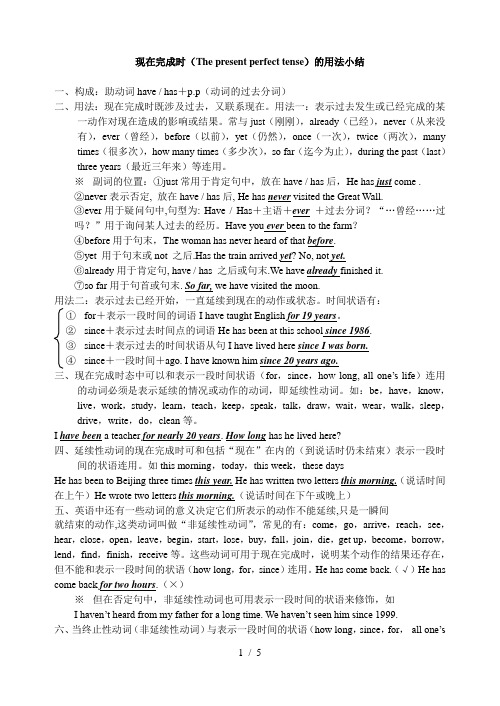
现在完成时(The present perfect tense)的用法小结一、构成:助动词have / has+p.p(动词的过去分词)二、用法:现在完成时既涉及过去,又联系现在。
用法一:表示过去发生或已经完成的某一动作对现在造成的影响或结果。
常与just(刚刚),already(已经),never(从来没有),ever(曾经),before(以前),yet(仍然),once(一次),twice(两次),many times(很多次),how many times(多少次),so far(迄今为止),during the past(last)three years(最近三年来)等连用。
※副词的位置:①just常用于肯定句中,放在have / has后,He has just come .②never表示否定, 放在have / has后, He has never visited the Great Wall.③ever用于疑问句中,句型为: Have / Has+主语+ever+过去分词?“…曾经……过吗?”用于询问某人过去的经历。
Have you ever been to the farm?④before用于句末,The woman has never heard of that before.⑤yet 用于句末或not 之后.Has the train arrived yet? No, not yet.⑥already用于肯定句, have / has 之后或句末.We have already finished it.⑦so far用于句首或句末. So far, we have visited the moon.用法二:表示过去已经开始,一直延续到现在的动作或状态。
时间状语有:①for+表示一段时间的词语I have taught English for 19 years。
②since+表示过去时间点的词语He has been at this school since 1986.③since+表示过去的时间状语从句I have lived here since I was born.④since+一段时间+ago. I have known him since 20 years ago.三、现在完成时态中可以和表示一段时间状语(for,since,how long, all one’s life)连用的动词必须是表示延续的情况或动作的动词,即延续性动词。
现在完成时用法小结优秀3篇
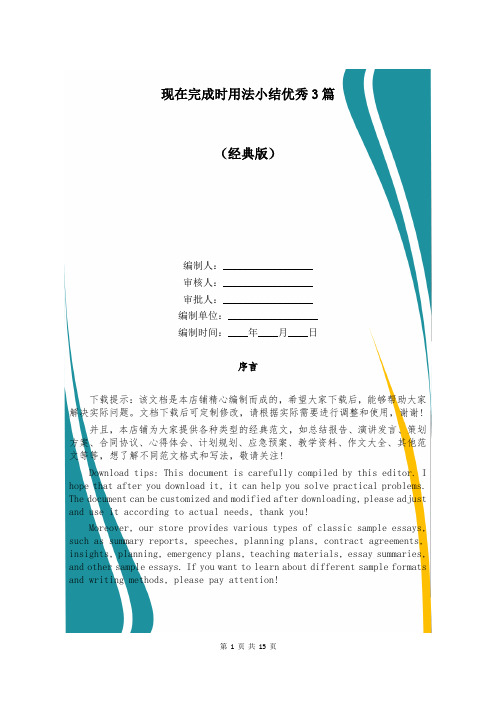
现在完成时用法小结优秀3篇(经典版)编制人:__________________审核人:__________________审批人:__________________编制单位:__________________编制时间:____年____月____日序言下载提示:该文档是本店铺精心编制而成的,希望大家下载后,能够帮助大家解决实际问题。
文档下载后可定制修改,请根据实际需要进行调整和使用,谢谢!并且,本店铺为大家提供各种类型的经典范文,如总结报告、演讲发言、策划方案、合同协议、心得体会、计划规划、应急预案、教学资料、作文大全、其他范文等等,想了解不同范文格式和写法,敬请关注!Download tips: This document is carefully compiled by this editor. I hope that after you download it, it can help you solve practical problems. The document can be customized and modified after downloading, please adjust and use it according to actual needs, thank you!Moreover, our store provides various types of classic sample essays, such as summary reports, speeches, planning plans, contract agreements, insights, planning, emergency plans, teaching materials, essay summaries, and other sample essays. If you want to learn about different sample formats and writing methods, please pay attention!现在完成时用法小结优秀3篇现在完成时表示过去发生的动作对现在造成的。
现在完成时用法大全
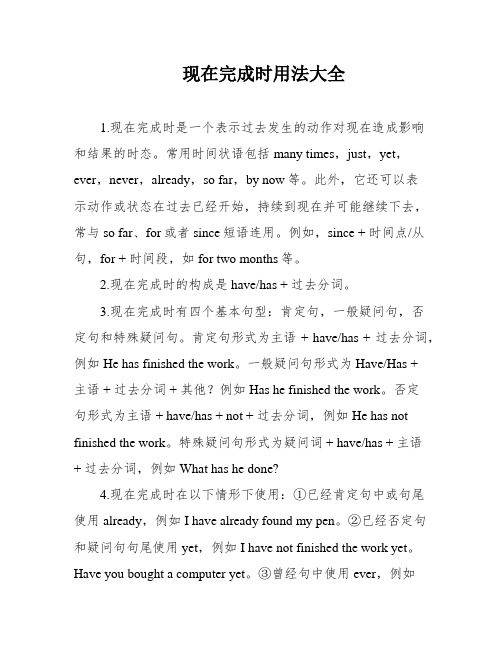
现在完成时用法大全1.现在完成时是一个表示过去发生的动作对现在造成影响和结果的时态。
常用时间状语包括many times,just,yet,ever,never,already,so far,by now等。
此外,它还可以表示动作或状态在过去已经开始,持续到现在并可能继续下去,常与so far、for或者since短语连用。
例如,since + 时间点/从句,for + 时间段,如for two months等。
2.现在完成时的构成是have/has + 过去分词。
3.现在完成时有四个基本句型:肯定句,一般疑问句,否定句和特殊疑问句。
肯定句形式为主语 + have/has + 过去分词,例如He has finished the work。
一般疑问句形式为Have/Has +主语 + 过去分词 + 其他?例如Has he finished the work。
否定句形式为主语 + have/has + not + 过去分词,例如He has not finished the work。
特殊疑问句形式为疑问词 + have/has + 主语+ 过去分词,例如What has he done?4.现在完成时在以下情形下使用:①已经肯定句中或句尾使用already,例如I have already found my pen。
②已经否定句和疑问句句尾使用yet,例如I have not finished the work yet。
Have you bought a computer yet。
③曾经句中使用ever,例如Have you ever seen pandas。
④从不句中使用never,例如I have never been to Beijing。
⑤刚刚句中使用just,例如I have just done my work。
⑥以前句尾使用before,例如I have never been there before。
现在完成时知识点归纳与总结

现在完成时知识点归纳与总结一、构成。
“have/has + 过去分词”二、用法。
1. 表示过去发生或已经完成的动作对现在造成的影响或结果。
- I have lost my key. (我把钥匙丢了,导致现在进不了门。
)2. 表示过去已经开始,持续到现在的动作或状态。
- We have lived here for ten years. (从过去到现在一直住在这里。
)三、时间状语。
1. already(已经),yet(还,尚未)- I have already finished my homework. (肯定句中用 already)- Have you finished your homework yet? (否定句、疑问句中用 yet)2. ever(曾经),never(从不)- Have you ever been to Beijing?- I have never seen such a beautiful place.3. just(刚刚)- He has just come back.4. so far(到目前为止),up to now(直到现在)- So far, we have learned five units.5. for + 时间段,since + 时间点。
- I have known him for five years.- She has been here since 2010.四、have been to / have gone to 的区别。
1. have been to 表示“去过某地(已回)”。
- I have been to Shanghai twice.2. have gone to 表示“去了某地(未回)”。
- He has gone to Beijing. (说明他不在说话地,去北京了。
)五、现在完成时与一般过去时的区别。
1. 现在完成时强调过去的动作对现在的影响,一般过去时只强调过去的动作,与现在无关。
现在完成时的四种用法
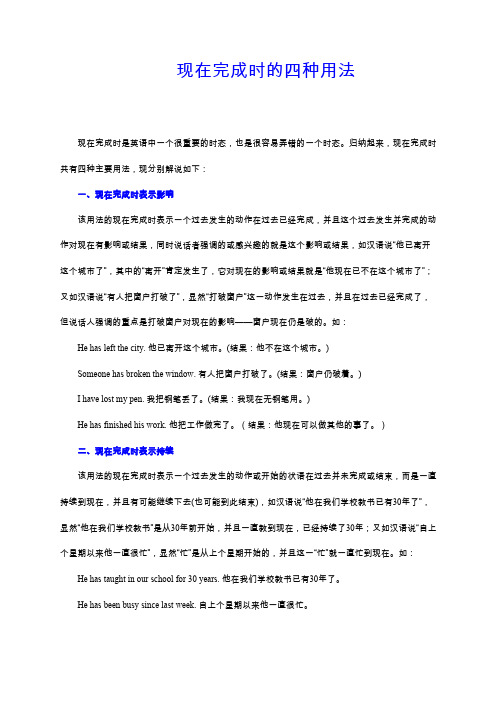
现在完成时的四种用法现在完成时是英语中一个很重要的时态,也是很容易弄错的一个时态。
归纳起来,现在完成时共有四种主要用法,现分别解说如下:一、现在完成时表示影响该用法的现在完成时表示一个过去发生的动作在过去已经完成,并且这个过去发生并完成的动作对现在有影响或结果,同时说话者强调的或感兴趣的就是这个影响或结果,如汉语说“他已离开这个城市了”,其中的“离开”肯定发生了,它对现在的影响或结果就是“他现在已不在这个城市了”;又如汉语说“有人把窗户打破了”,显然“打破窗户”这一动作发生在过去,并且在过去已经完成了,但说话人强调的重点是打破窗户对现在的影响——窗户现在仍是破的。
如:He has left the city. 他已离开这个城市。
(结果:他不在这个城市。
)Someone has broken the window. 有人把窗户打破了。
(结果:窗户仍破着。
)I have lost my pen. 我把钢笔丢了。
(结果:我现在无钢笔用。
)He has finished his work. 他把工作做完了。
(结果:他现在可以做其他的事了。
)二、现在完成时表示持续该用法的现在完成时表示一个过去发生的动作或开始的状语在过去并未完成或结束,而是一直持续到现在,并且有可能继续下去(也可能到此结束),如汉语说“他在我们学校教书已有30年了”,显然“他在我们学校教书”是从30年前开始,并且一直教到现在,已经持续了30年;又如汉语说“自上个星期以来他一直很忙”,显然“忙”是从上个星期开始的,并且这一“忙”就一直忙到现在。
如:He has taught in our school for 30 years. 他在我们学校教书已有30年了。
He has been busy since last week. 自上个星期以来他一直很忙。
英语微信群是目前学习英语最有效的方法,群里都是说英语,没有半个中文,而且规则非常严格,是一个超级不错的英语学习环境,群里有好多英语超好的超牛逼的人,还有鬼佬和外国美眉。
现在完成时的用法总结

现在完成时的用法总结1.现在完成时的构成:- 一般动词:动词原形 + ed(例如:worked)- 以不发音的“e”结尾的动词:动词原形 + d(例如:lived)- 以辅音字母+y结尾的动词:变y为i,再加ed(例如:studied)2.现在完成时的用法:- 表示过去的经历或经验:I have visited China twice.(我去过中国两次。
)- 表示过去开始的动作一直延续到现在:She has lived in London for five years.(她在伦敦住了五年了。
)- 表示过去发生的动作对现在产生的影响:I have lost my keys.(我把钥匙弄丢了。
)- 表示过去完成的动作对现在产生的结果:They have finishedtheir homework, so they can go out to play.(他们做完作业了,所以可以出去玩。
)- 表示刚刚发生的动作:Have you seen the movie?(你看过这部电影吗?)3.现在完成时的时间状语:- 强调完成的时间段:for/during + 时间段(例如:for two hours, during the summer)- 强调完成的具体时间点:in + 具体时间(例如:in 2005, in the morning)- 强调从过去其中一时刻一直延续到现在:since + 过去时点(例如:since last week, since I was a child)4.现在完成时与一般过去时的区别:- 现在完成时:I have finished my work.(我已经完成了我的工作。
)- 一般过去时:I finished my work.(我完成了我的工作。
)5.现在完成时的否定句和疑问句:- 否定句:在助动词“have/has”后加not(haven't/hasn't),例如:I haven't seen him.(我没有见过他。
现在完成时的用法与实例分析
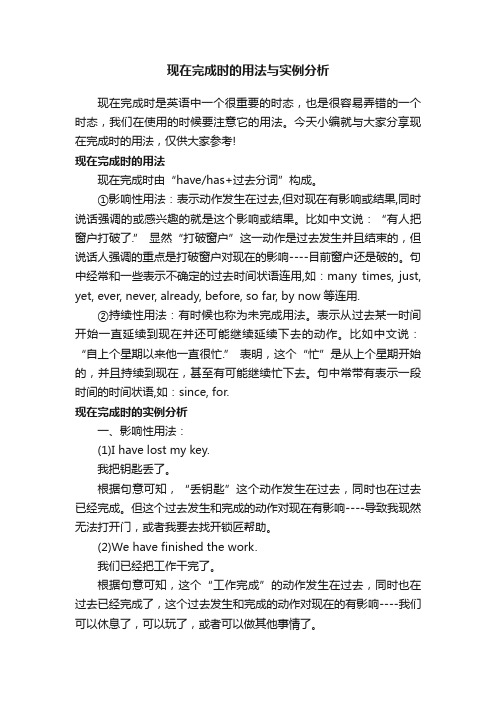
现在完成时的用法与实例分析现在完成时是英语中一个很重要的时态,也是很容易弄错的一个时态,我们在使用的时候要注意它的用法。
今天小编就与大家分享现在完成时的用法,仅供大家参考!现在完成时的用法现在完成时由“have/has+过去分词”构成。
①影响性用法:表示动作发生在过去,但对现在有影响或结果,同时说话强调的或感兴趣的就是这个影响或结果。
比如中文说:“有人把窗户打破了.” 显然“打破窗户”这一动作是过去发生并且结束的,但说话人强调的重点是打破窗户对现在的影响----目前窗户还是破的。
句中经常和一些表示不确定的过去时间状语连用,如:many times, just, yet, ever, never, already, before, so far, by now等连用.②持续性用法:有时候也称为未完成用法。
表示从过去某一时间开始一直延续到现在并还可能继续延续下去的动作。
比如中文说:“自上个星期以来他一直很忙.” 表明,这个“忙”是从上个星期开始的,并且持续到现在,甚至有可能继续忙下去。
句中常带有表示一段时间的时间状语,如:since, for.现在完成时的实例分析一、影响性用法:(1)I have lost my key.我把钥匙丢了。
根据句意可知,“丢钥匙”这个动作发生在过去,同时也在过去已经完成。
但这个过去发生和完成的动作对现在有影响----导致我现然无法打开门,或者我要去找开锁匠帮助。
(2)We have finished the work.我们已经把工作干完了。
根据句意可知,这个“工作完成”的动作发生在过去,同时也在过去已经完成了,这个过去发生和完成的动作对现在的有影响----我们可以休息了,可以玩了,或者可以做其他事情了。
二、持续性用法:(1)Mr.Jack has lived in China since 2002.杰克自从2002年开始就一直住在中国。
根据句意可知,“住在中国”是从2002开始的,但它在过去没有完成,而是一直持续到现在,已经很多年了,甚至继续持续下去。
英语现在完成时用法总结
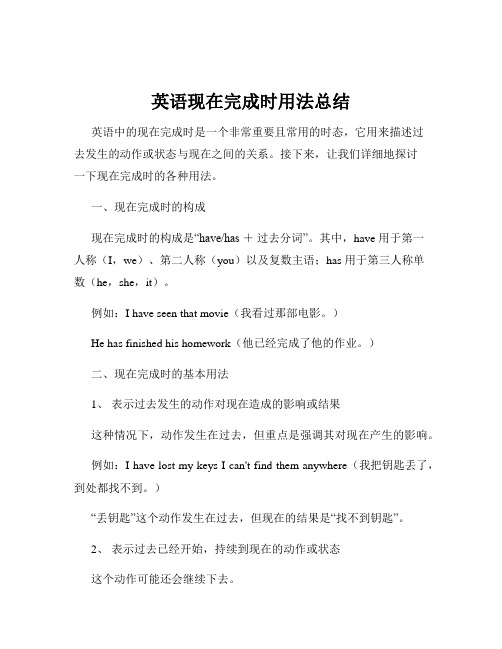
英语现在完成时用法总结英语中的现在完成时是一个非常重要且常用的时态,它用来描述过去发生的动作或状态与现在之间的关系。
接下来,让我们详细地探讨一下现在完成时的各种用法。
一、现在完成时的构成现在完成时的构成是“have/has +过去分词”。
其中,have 用于第一人称(I,we)、第二人称(you)以及复数主语;has 用于第三人称单数(he,she,it)。
例如:I have seen that movie(我看过那部电影。
)He has finished his homework(他已经完成了他的作业。
)二、现在完成时的基本用法1、表示过去发生的动作对现在造成的影响或结果这种情况下,动作发生在过去,但重点是强调其对现在产生的影响。
例如:I have lost my keys I can't find them anywhere(我把钥匙丢了,到处都找不到。
)“丢钥匙”这个动作发生在过去,但现在的结果是“找不到钥匙”。
2、表示过去已经开始,持续到现在的动作或状态这个动作可能还会继续下去。
例如:I have lived here for five years(我在这里住了五年了。
)“居住”这个动作从过去开始,一直持续到现在。
3、表示经历或经验例如:She has visited many countries(她游览过很多国家。
)三、常与现在完成时连用的时间状语1、 already(已经),通常用于肯定句中例如:I have already finished my work(我已经完成了我的工作。
)2、 yet(还,尚未),用于疑问句和否定句中例如:Have you finished your homework yet?(你作业做完了吗?)I haven't eaten yet(我还没吃。
)3、 just(刚刚)例如:He has just left(他刚刚离开。
)4、 ever(曾经)例如:Have you ever been to Beijing?(你曾经去过北京吗?)5、 never(从不)例如:I have never seen such a beautiful place(我从未见过如此美丽的地方。
- 1、下载文档前请自行甄别文档内容的完整性,平台不提供额外的编辑、内容补充、找答案等附加服务。
- 2、"仅部分预览"的文档,不可在线预览部分如存在完整性等问题,可反馈申请退款(可完整预览的文档不适用该条件!)。
- 3、如文档侵犯您的权益,请联系客服反馈,我们会尽快为您处理(人工客服工作时间:9:00-18:30)。
现在完成时用法小结(只摘抄黑体字部分,蓝体字只读不摘抄,第二种用法只学不摘抄)现在完成时用来表示说话之前已发生或完成的动作或状态,其结果和现在有联系。
动作或状态发生在过去,但它的影响现在还存在;也可表示从过去开始持续到现在的动作或状态。
属于现在时态的范畴。
其构成:助动词have (has) +过去分词。
肯定式:主语 + have/has + 过去分词 + 其他。
(当主语是第三人称单数时用has,其余人称用have。
过去分词:规则动词的过去分词构成与动词过去式相同;不规则动词需要特殊记忆。
)否定式:主语 + haven't/hasn't + 过去分词 + 其他。
疑问式: Have /Has + 主语 + 过去分词 + 其他? 简略答语:Yes, 主语 + have/has.(肯定)No, 主语 + haven't/hasn't.(否定)(一)表示过去发生或完成的某一动作对现在造成的影响或结果。
如: Have you read that story?你读过那个故事吗?(“读”这一动作发生在过去,对现在造成的影响是:是否知道故事的内容。
)I have bought two apples.我买了两个苹果。
(“买”这一动作发生在过去,对现在造成的结果是:拥有两个苹果。
)请朗读下面句子,体会现在完成时的含义。
(以下句子摘抄两句)1.I have finished my homework. ( My homework is done, I can do something else.)2. She has seen the doctor. ( Now she knows what’s wrong with her.)3. They have seen the film. ( Now they know what the film is about.)4. Lily has lost her pen. ( Now she can’t see it.)5. Have you found your watch? ( Do you have your watch now?)6. Has the train arrived? ( Can we get on the train now?)7. Has Jenny invited you to her party? ( Do you know her party? Will you go?)8. I haven’t borrowed a book from the library. ( Now I don’t have a library book.)9. Jim hasn’t read the story. ( He doesn’t know about the story.)10. I have n’t washed my clothes. ( My clothes are still dirty.)请将下面句子变成否定句,一般疑问句,并做肯定否定回答,同时体会各个句子的含义,领悟现在完成时的用法。
(摘抄两个句子)1.Jim has returned the book to the library.2.I have bought a new pair of shoes.3.The students have swept the floor.4.I have told the teacher about it.5.The train has left the station.6.Jenny has turned off the lights.7.My mother has cooked supper for us.8. We have done our homework.现在完成时的"完成用法"现在完成时的"完成用法"指的是动作发生在过去某一时刻并已结束,但该动作对现在产生了影响,与现在情况具有因果关系。
现在完成时"完成用法"的特点是动作不延续,因此,该时态只能与表示不定的时间状语(如:already,yet,before,recently等)、频度时间状语(如:never,ever,once等)、包括现在时刻在内的时间状语(如:this morning / month /year...,today等)连用。
现在完成时的时间状语(1)现在完成时属于现在时范围,故不能和过去的时间状语连用。
如:yesterday,last Sunday, in1990,three years ago等。
a.用副词already,yet和just。
already“已经,”一般用于肯定句中,yet“已经,还”一般用于否定句和疑问句中。
如:We have already finished our homework.(We have finished our homework already.)我们已完成作业了。
They haven't finished their homework yet.他们还没有完成作业。
-Have you washed your clothes yet?-No,not yet.just “刚刚”,常用于肯定句.注意,just now是过去的时间状语,只能与过去时连用.The train has just left.(It’s not here now.)The train left just now.I have just cleaned the room.(The room is clean now.)I cleaned the room just now.b. 用ever 和never。
多用于否定或疑问句中,表示“曾经”或“从未“等。
如:-Have you ever been to the Great Wall?你曾经去过长城吗?-I have never been to the Great Wall.我从未去过长城。
c.用表示到说话为止的过去时间状语,如just,before,up to now,the past few years等。
例如:I have seen her before,but I can not remember where.我以前见过她,但记不起在哪里见过。
He has been there three times the last few days. 近几年他去过那里三次了。
d.用包括“现在”在内的时间状语,如:now,today,thismorning (month,year,term)等。
例如:-Have you met him today?-No,I haven't.今天你见过他吗?我没有。
How many times have you been there this year? 今年你去过那里多少次?在学习这一概念的同时,还应注意常与现在完成时连用的几个副词:already,just,ever,yet,never 等。
already,just多用于肯定句中,ever,yet,never 多用于疑问句和否定句中。
如: I have already finished my homework.我已经做完家庭作业了。
He has just had his meal.他刚吃过饭。
Have you ever sung this English song?你曾唱过这首英文歌吗?They haven't started yet.他们还没有动身。
We have never heard of it.我们从来没有听说过这件事。
(以下内容只学习,不摘抄)(二)表示过去已经开始,一直持续到现在的动作或状态。
1、因为表示的是持续的动作或状态,所以使用的动词通常是延续性动词:be, stay, study, wait, keep, have… 等;2、使用的时间状语通常由for或since 引导,但二者后接的词有所不同:for后常跟一个时间段,指某个动作到现在为止已持续了多长时间。
如:for three years, for half an hour等。
since 作介词,后面可以接一个时间点,如since 1980,也可以接“一段时间+ago”,如: since three years ago, since two months ago等。
since 还可用作连词,引导一个过去时态的时间状语从句。
如:We have known each other since we went to college.3、非延续性动词不能直接和for 或since 连用,但我们可以找一个相应的延续性动词或动词短语来替换这些非延续性动词,如: become→be,come to→be in / at,go out→ be out,leave→be away(from),begin→be on,stop→ be over,buy→ have,borrow→ keep,open→be open,close→be closed,join→be a member of/be in,die→be dead,catch a cold→have a cold,get to know→know,become a teacher →be a teacher, fall asleep→be asleep,fall ill→ be ill等。
4、句型It is the first (second, third...) time that...的that从句中,谓语动词须用现在完成时,表示到说话时为止动作发生过几次。
如:It is the first time that I have been here. (三)现在完成时与一般过去时的用法比较1、一般过去时表示过去某个时间发生的事、存在的状态或经常发生的动作。
说话的侧重点只在于陈述一件过去的事情,不强调对"现在"产生的影响。
如: He visited Guilin in 1998.他1998年参观过桂林。
(只说明去桂林的时间) 2、现在完成时表示动作发生在过去,对现在造成了影响或产生了结果。
不与确定的过去时间状语连用。
如: Jill has bought a new computer.吉尔买了一台新电脑。
(着重点是现在有了一台新电脑)3、两种时态的区分(1)一般过去时的谓语动词用过去式,而现在完成时的谓语基本构成是"助动词have /has +过去分词"。
